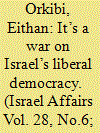| Srl | Item |
| 1 |
ID:
187564


|
|
|
|
|
| Summary/Abstract |
This article examines the discourse of the Israeli Left in the years preceding the succession of general elections in 2019–21, with a focus on claims of the purported threats to democracy presented by the right-wing government. Rhetorical analysis of opinion pieces and political commentary in the press on issues relating to education, science, and culture shows recurrent use of appeals to fear – such as comparisons with totalitarian regimes and invocation of other dystopian spectres resulting from nationalist indoctrination and processes of ‘religionization’. This article defines the appeal to fear and other forms of the Left’s identity claims making during this period as moral panic discourse, around which the Left sought to revive its relevance in the public debate at a time when it was viewed as a marginal political force in ideological decline. The article’s main argument is that while the labelling of the Right as a ‘danger to democracy’ has been entrenched in leftist discourse since the 1977 ‘Upheaval’, during the period in discussion it became the principal – almost sole – theme in leftist publicist discourse, serving as a flag issue around which the Left reorganised its identity as the ‘democratic camp’.
|
|
|
|
|
|
|
|
|
|
|
|
|
|
|
|
| 2 |
ID:
132904


|
|
|
|
|
| Publication |
2014.
|
| Summary/Abstract |
The trifecta of disasters in japan that unfolded on 1 1 March 201 1 strains credibility: a 9.0-level earthquake (the largest ever recorded in Japan), a thousand- year tsunami that devastated a 300-kilometer stretch of coastline in northeastern Japan, and three nuclear reactors in meltdown, exposing signi?cant portions of japan to potentially dangerous levels of radiation. In the aftermath of these unprecedented disasters, the meaning and signi?cance of this disaster have evolved. As Japanese government authorities and the general public alike have come to un(ierstand the nuclear disaster in more nuanced terms, retrospective evaluations now cast this crisis in its historical context and are coming to calibrate the level of significance in more consistent terms than was the case in the immediate aftermath of the disaster. This article analyzes how media and government authorities assessed the Liu Kushima nuclear disaster from its onset and considers how cultural frames of reference came into play, leading to selective perceptions about the nature of the accident and its presumed effects. The author discusses the nuclear disaster as a "moral panic," as the media constructed a narrative arch that ampli?ed perceptions of risk in often melodramatic terms, filtering information that shaped public perception and influenced the action of decision-making elites. In addition to discussing how the nuclear disaster affected Japanese domestic politics, the article addresses the impact of the nuclear disaster on international alliances and its implications for the nuclear industry.
|
|
|
|
|
|
|
|
|
|
|
|
|
|
|
|